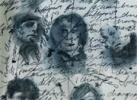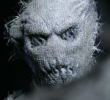Human Nature
Previously, on Doctor Who…
From 1963 to 1989, Doctor Who had an unbroken1 run of television stories until it fell from favour at the BBC and got itself cancelled. Everyone was sad. Then, the ‘New Adventures’ started, a series of original novels that continued the story from the series.2 They were occasionally dodgy, but frequently awesome. The writer of the first awesome one — ‘Timewyrm: Revelation’ — was Paul Cornell, and he went on to write several more good ones and one or two not-so-good ones. His best, perhaps, was ‘Human Nature’.3
Flash forward several years. Bizarrely, Doctor Who is now the biggest thing on British television, or so I understand. And after writing ‘Father’s Day’ for them in season one, Cornell comes back to adapt his novel for the small screen. It’s often noted that reading the book first is a sure recipe to hate the adaptation; luckily I doubt a very large percentage of people who saw ‘Human Nature’ on the telly last week have to worry about that.
In a nutshell, then. Pursued by nasty aliens across time and space, the Doctor realises that they can smell his unique Time Lordity, and so he hides himself on Earth in 1913 as a human schoolteacher, with a new, constructed character and no memory of his normal life. The aliens follow; death, destruction and sacrifice ensue.
One of the tricks with two-parters these days is the pacing. A lot of first episodes end up feeling like all set-up, and no actual incident. My usual view is that if this happens, the first episode is either validated or condemned by what the second episode does with all the bits that part one left for it.4 In this case, ‘Human Nature’ is concerned mostly with establishing the situation, telling the love story of John Smith and Joan Redfern, and moving the Family into the position where they finally start to cause public chaos, while making John choose between his lover or his friend.5 ‘The Family of Blood’ follows up by continuously alternating between violence and making you cry, which isn’t a bad little formula.
The key to the story is John Smith, of course. Slightly cowardly, a bit racist, occasionally condescending, kind and loving, approving of strict discipline. Your typical 1913 man, maybe. At first, he’s slightly irritating, until the second half of the story hammers home that he’s not actually the Doctor at all, but an innocent creation from the Doctor’s subconscious, who just wants a normal life. Tennant plays this marvellously, making quite an abstract concept very real and moving.
When the actual Doctor does turn up in this story, he’s suitably impressive — and a bit disturbing. But of the two regulars, it’s Martha who comes out of this story the best. I don’t know if it’s just my fickle imagination, but she feels far more competent and organised than Rose ever was. Holding the Family back with a gun, slapping John, refusing to be baited by 1913’s unattractive racism, Martha just rocks.
When I come to inevitably compare the serial with the original novel, it’s hard to say which is better. Having the Doctor hiding from the Family instead of just going on holiday as a human gives the story a bit more energy and focus. The lack of time spent with Tim in part one however, dilutes a bit of that. The scene when the Family cock their heads at him, only to suddenly reappear back at their spaceship in the next cut, jarred a little, and it would have been nice to see more of a hint of Tim’s slowly increasing Doctorishness earlier. There seemed a certain awkwardness when we finally flashed forward to his war experiences, but this might in part be my frustrated expectation that he was going to be revealed to be a medic, as he was in the book.6
But taking the episodes on their own terms, they’re some of the best Who we’ve had in the last three years. Genuinely spooky, thrilling and moving. Over-the-top, yet engaging villains. Like many past episodes, ‘Human Nature’ interrogates the consequences of the Doctor’s life — but it’s even better for asking whether anyone sensible would ever want to actually be him.
- Well, technically there’s a break in 1984 for a year. But 21 is still a larger number, than say, 10. Just to pick a number at random. ↩
- Like these Buffy comics, but I think everyone can agree that novels are cooler than comic books. ↩
- Which you can now read online again. Or, if you’re close, you can borrow my copy if you get in the queue. ↩
- Also, I feel justified in writing one review for two episodes. Sweet. ↩
- A decision which I always think of as the Batman Forever dilemma. It’s cool the first time you see it, and gets gradually more irritating each time after that. Especially if, such as in this case, the hero doesn’t even get to choose “both of them”, which is of course the correct answer. Except in Batman Forever, when the correct answer would have been “Nicole Kidman”. ↩
- Which I would have preferred. It seems the neatest and most noble solution to not wishing to fight in war, and also, it means he ends up a doctor. Well, alright, you’re just patching people up to go out and kill other people, so it’s not completely noble, but hey. ↩


